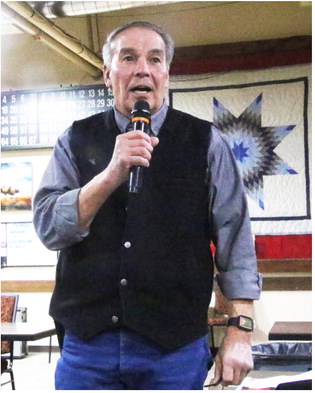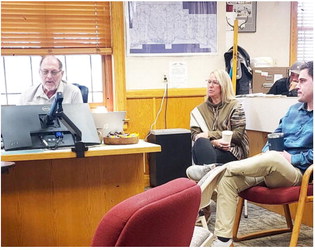Montana Senate Committee Amends Obscenity Bill During Session
The Senate Education and Cultural Resources Committee put the knife to Rep. Bob Phalen’s obscenity bill on Wednesday, April 12, which sought to punish schoolteachers and school librarians who provide “obscene” material to students, amending the bill to effectively maintain local control over what materials are available to kids in school and clarifying existing law surrounding obscenity.
The amended version of House Bill 234 clarifies the difference between public display or dissemination of obscene material to minors and obscenity, which are in different portions of statute already in Montana Code Annotated.
The amendment from Committee Chairman Dan Salomon, R-Ronan, strikes all the language from MCA 45-8-206, the existing portion of law involving the public display or dissemination of obscene material to minors, that discussed library, school, and museum employees, as well as the portion that the original version of Phalen’s bill had added in.
It then clarifies that the offense of public display or dissemination of obscene material to minors is a separate portion of law than the offense of obscenity, which is outlined in MCA 45-8-201.
The amendment to the portion of code on disseminating obscene material to minors further clarifies that local municipalities and school districts can adopt ordinances, resolutions and policies that are more restrictive than the language already in the statute – effectively reiterating that local governments and school districts have their own power to make stronger laws through local control.
Montana Code already states that a person controlling “any commercial establishment or newsstand” cannot display or provide minors with obscene material and that they face penalties for doing so. Salomon’s amendment also clarifies that neither “commercial establishment” nor “newsstand” includes a school, library or museum.
Pad McCracken, the research analyst for the committee, told members he felt there was a misunderstanding and confusion about the differences between the disseminating obscene material statute and the obscenity statute, and that his amendment was the fix he and Salomon came up with to solve that confusion.
Salomon said he felt some of the proponents of Phalen’s bill had been upset their local school boards did not get rid of certain books and materials they had objected to, but told the committee Wednesday evening that wasn’t something the legislature should be deciding.
“There’s an issue that isn’t in this bill – we can’t legislate that,” he said. “They have an issue with their local control, they need to get other people in there or have that conversation at the local level. That’s not for us to decide. That’s for the people that are there and the people that are in power to make those policies.”
Salomon said he felt like ensuring the discussion about what materials are obscene should be left up to the local school districts and boards, and that he was pleased that there was still an option for districts to create stronger policies if they choose.
The amendment passed unanimously, and the bill cleared the committee in a 7-4 party-line vote, with Republicans in favor.
“I think this amendment meets the spirit of sponsor while satisfying some critics of the bill,” said Sen. John Fuller, R-Kalispell.
Essentially, McCracken told the committee when he explained the amendment, both the disseminating obscene material to minors statute and the separate obscenity statute were already in place — the former a statute made in 1989 that involved things like pornography at convenience stores and newsstands.
“So, what this amendment does is it really tries to draw a distinction, clarify that distinction,” McCracken said.
He said in 1989, libraries felt they might be viewed as newsstands, which is why the exemption for them was put into law in the first place. The amendment essentially keeps the exemption in place by clarifying that libraries, schools and museums are not “commercial enterprises” or “newsstands.”
The changes to the Lindsay Republican’s controversial bill made Wednesday came as the committee took executive action on it — five days after its committee hearing in which a proponent of the bill called for “book burning” and another claimed Salomon was censoring their testimony because he did not allow them to read sexually explicit book passages into the record.
The amendment keeps penalties for both disseminating obscene material to minors and for obscenity in place, but clarifies that anyone who committed such crimes would have to be charged under the specific statute.
“The obscenity part, 201, was already there. We didn’t really need to change that. That’s the part that says, ‘I don’t care who you are. If you do this, that’s obscenity,’” Salomon told the committee. “But then we got into the second part — obscene material to minors — well, that really wasn’t the same thing. And we had to differentiate that, and we had to put this in a way that hopefully we can all understand and become much clearer for us. And hopefully it works.”
Phalen and other proponents have said lawmakers should back the bill to protect children from seeing materials in schools they feel contain “obscene” material, citing on multiple occasions books on the LGBTQ community like Gender Queer and others containing profanity and descriptions of sexual acts, like The Absolutely True Diary of a Part-Time Indian.
The bill narrowly passed the House in early February in a 53-45 vote and had sat in the laurels until its first Senate committee hearing last Friday.
Two-dozen proponents testified at last week’s hearing, saying though the materials they deem to be obscene were not available in all school libraries across the state, they worried that those materials being available in some schools would lead to them spreading into their local districts. Some of the proponents were parents who had unsuccessfully petitioned their school boards to have books removed from school libraries.
“All my opponents can think about is the penalty, which is only a misdemeanor. It seems that the children here are just playing second fiddle. So, let’s be adults and the good examples for them to follow,” Phalen said at the hearing.
More than 30 opponents, including teachers, public employee representatives, students and library representatives, testified that the bill would only disregard local school and school board control and drive more teachers away from Montana as it deals with a teacher shortage.
“Please don’t drive a further wedge between parents, kids and their teachers by waging a national culture war here in Montana,” said Sarah Piper, the director of public policy and research with the Montana Federation of Public Employees.
McCracken used an analogy Wednesday about someone wearing pants with both suspenders and a belt. If someone took off the suspenders, their pants wouldn’t fall down, he told the committee, because they’re still covered by the belt.
“This idea that if we strike that exception, then we’re putting schools or public libraries in a new position, and I think the reality is it was not,” he said. “Part of the intent here was if the legislature wants to make a policy decision about the materials that are in school libraries, public libraries, do it in the right area of code. And don’t bog down a whole lot of folks’ time in multiple committees over a legislative session on this statute.”
The bill will be considered next on the Senate floor, and if it passes as amended, will have to go back to the House for consideration of the amended version.



